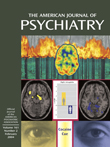Worsening of Hyponatremia With Electrolyte-Containing Beverage
To the Editors: Many clinicians use electrolyte-containing beverages to try to improve electrolyte balance in schizophrenia patients with polydipsia-induced hyponatremia. Although oral sodium chloride tablets transiently appear to improve hyponatremia (1), there is little evidence of the efficacy of electrolyte-containing drinks for such patients (2). Recently, however, a man who had life-threatening episodes of hyponatremia-induced coma because of his inability to control his polydipsia was treated with some success with an electrolyte-balanced sports drink (3). Described here is a polydipsic patient whose electrolyte status was worsened by attempting to substitute the sports drink for water.
Mr. A, a 47-year-old man with a history of schizophrenia of over 25 years’ duration, was hospitalized when he became psychotic after losing his medication (risperidone, 4 mg/day, and fluoxetine, 20 mg/day, since 1999). The medication was resumed, but improvement occurred slowly. At admission, his sodium level was 126 mmol/liter, and a review of his records showed levels fluctuating from 125 to 133 mmol/liter during the previous 2 years. His past medical history was otherwise unremarkable, and there was no significant history of alcohol or drug abuse.
Frequent compulsive consumption of water was observed. Other causes of hyponatremia, including hypothyroidism, renal insufficiency, adrenal insufficiency, and the syndrome of inappropriate antidiuretic hormone secretion, were ruled out. Magnetic resonance imaging of the brain revealed mild ventricular enlargement and generalized atrophy.
Attempts to limit his fluid consumption were enacted but were difficult to enforce. He was encouraged to substitute an electrolyte-containing beverage when he could not control his urge to drink water. He liked the beverage and consumed large quantities of it. Within 2 weeks, his sodium level gradually decreased to 118 mmol/liter, and he became confused and lethargic. He was then placed on closely monitored fluid restriction, and his sodium level rose to 128–134 mmol/liter, thus improving his mental status. Mr. A later revealed that he had thought that the beverage was a suitable substitute for water because of its salt content and that he could safely drink as much of it as he wanted. Thus, he had made no attempt to limit his intake.
Although the beverage he liked contains more electrolytes than other commercially available sports drinks, it still contains only 20 mmol/liter of sodium (110 mg per 8 fluid oz) (2). For the volume one would need to consume, drinking these beverages would appear to be a relatively inefficient method of increasing one’s sodium level. In addition, freely allowing hyponatremic patients access to such beverages may tend to encourage rather than discourage fluid consumption in a population that is already polydipsic. Although electrolyte-containing beverages could help certain polydipsic hyponatremic patients, treatment in most cases might better focus on preventing or reversing deficits in water balance rather than trying to limit their impact with supplemental electrolytes.
1. Vieweg WVR, Rowe WT, David JJ, Spradlin WW: Oral sodium chloride in the management of schizophrenic patients with self-induced water intoxication. J Clin Psychiatry 1985; 46:16–19Medline, Google Scholar
2. Goldman MB, Nash M, Blake L, Petkovic MS: Do electrolyte-containing beverages improve water balance in hyponatremic schizophrenics? J Clin Psychiatry 1994; 55:151–153Medline, Google Scholar
3. Quitkin FM, Garakani A, Kelly KE: Electrolyte-balanced sports drink for polydipsia-hyponatremia in schizophrenia (letter). Am J Psychiatry 2003; 160:385–386Link, Google Scholar



